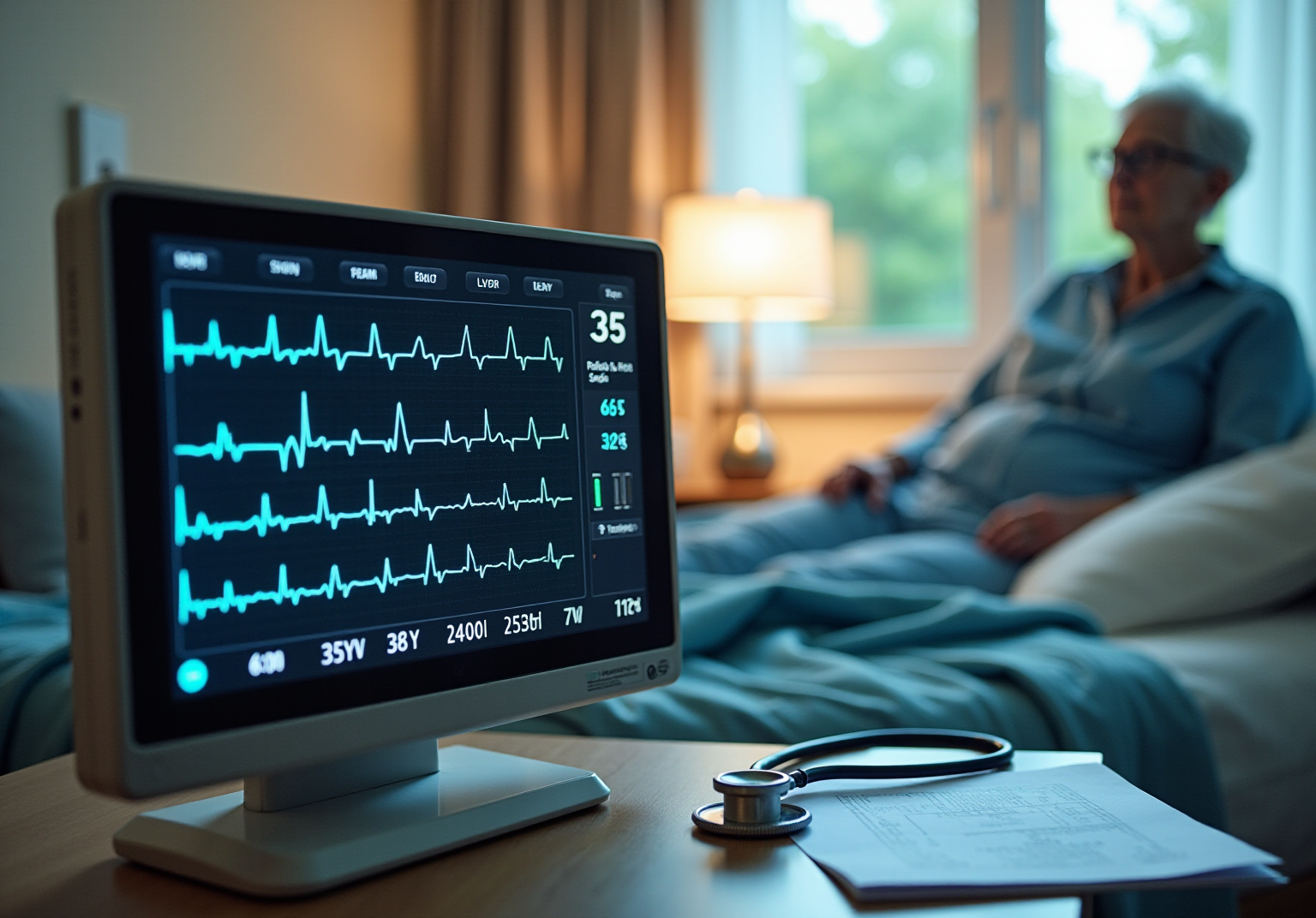


This article highlights the importance of understanding the EKG (electrocardiogram) in the context of heart attacks, particularly for seniors. It emphasizes how crucial EKG readings are in detecting both current and potential future cardiac events, addressing the concerns many older adults may have about their heart health.
By explaining EKG patterns, such as ST segment elevation and T-wave inversion, this article illustrates how these indicators can signal a heart attack. Furthermore, it underscores the value of regular monitoring, which can lead to early detection and improved treatment outcomes for older adults who are at a heightened risk of cardiovascular issues.
It's natural to feel anxious about heart health, but knowing that EKGs can provide vital insights can offer reassurance. Regular check-ups and monitoring can empower seniors to take control of their health, leading to better outcomes and peace of mind.
Remember, you are not alone in this journey; support is available, and taking proactive steps can make a significant difference.
Understanding the electrical signals of the heart is crucial, especially for seniors who face heightened risks of cardiovascular issues. Electrocardiograms (EKGs) serve as a vital tool in detecting irregularities that can indicate serious conditions like heart attacks, enabling timely medical intervention.
But you might wonder: how can these readings not only reveal current heart health but also predict future risks? Delving into the nuances of EKGs can empower you to take proactive steps in safeguarding your cardiovascular well-being.
Remember, knowledge is a powerful ally in your health journey.
An electrocardiogram (EKG or ECG) is a non-invasive test that captures the electrical activity of the heart over time, offering essential insights into its rhythm, size, and position. For seniors, the importance of EKGs is profound, as they play a crucial role in identifying conditions like arrhythmias, coronary artery disease, and prior cardiac events. Recent studies indicate that abnormalities in EKG readings are significantly linked to an increased risk of coronary artery disease (CHD), including the EKG of a heart attack, as well as cardiovascular-related fatalities, even when accounting for common factors such as smoking and high cholesterol.
For example, a study involving over 2,192 healthy adults aged 70 and older revealed that those with minor EKG changes had a 35% higher likelihood of experiencing heart events during an eight-year follow-up. This underscores the as a vital resource in monitoring cardiovascular health, particularly for elderly individuals who face a greater risk of heart-related issues. Regular EKG assessments can assist healthcare providers in making informed decisions about treatment and preventive strategies, ultimately improving patient outcomes.
As Dr. Reto Auer highlights, while EKGs are often performed in emergency situations, their predictive value in routine screenings for asymptomatic seniors is still being explored. However, integrating EKG results into electronic health records, alongside Amavita's comprehensive cardiovascular wellness programs, could greatly enhance the assessment and management of older patients, ensuring they receive the thorough care they deserve.
Have you considered how regular check-ups can support your heart health? Taking proactive steps can lead to better outcomes and peace of mind. Remember, you are not alone in this journey; there are resources and professionals ready to help you every step of the way.
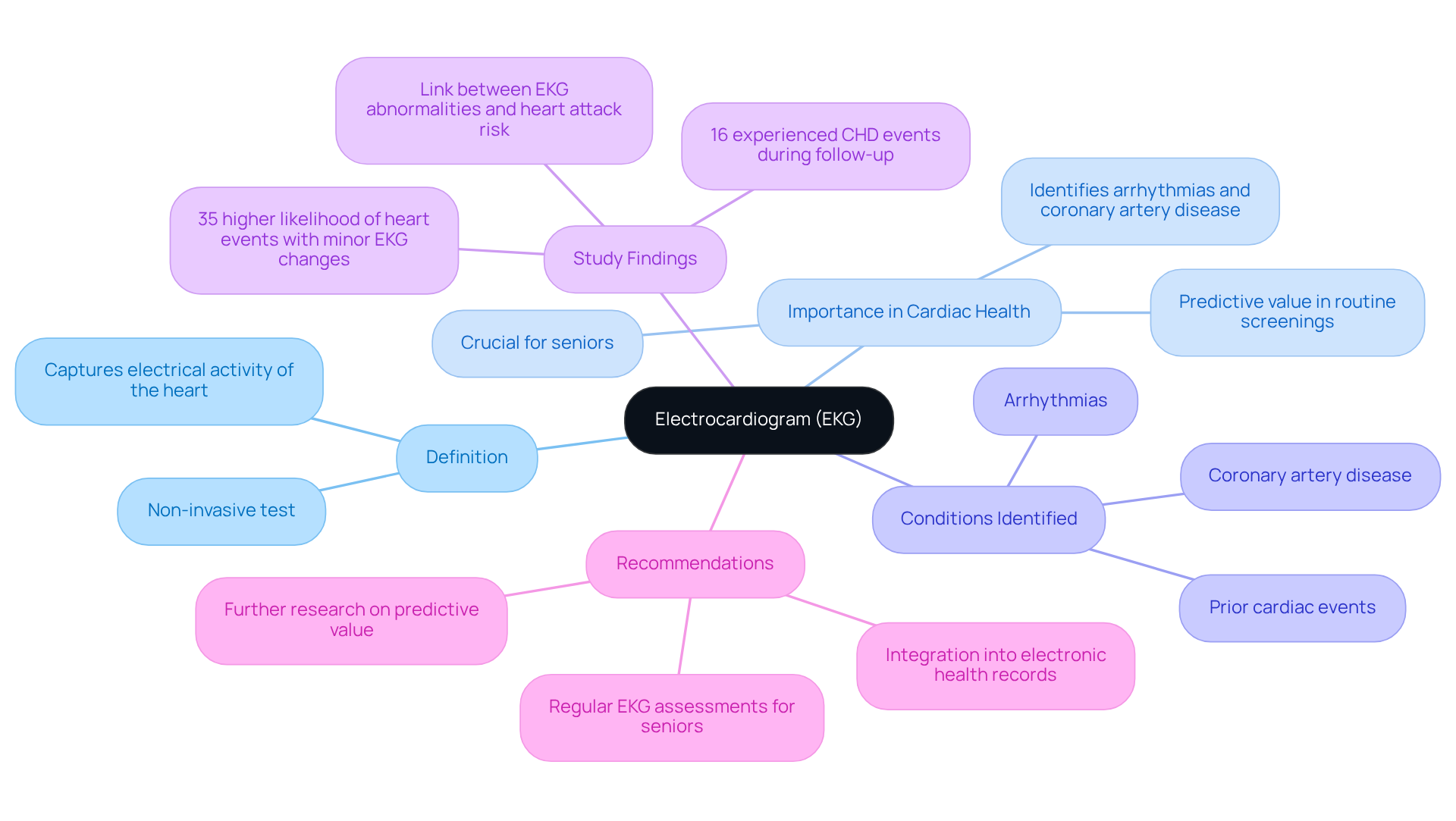
Understanding specific EKG patterns, including the EKG of a heart attack, is essential for recognizing potential cardiac events, particularly for older adults who may be at increased risk. Key features to monitor include:
The presence of abnormal Q Waves in the EKG of a heart attack can indicate a previous myocardial infarction, reflecting past damage to the cardiac muscle. Understanding this can help seniors and their caregivers appreciate the importance of , especially with the advanced AI-driven diagnostic technology available through the Amavita CardioElite™ program.
By familiarizing themselves with these EKG patterns, seniors can gain insight into the EKG of a heart attack, which can help them know when to seek immediate medical attention, potentially saving their lives. Electrocardiograms, such as the EKG of a heart attack, are capable of identifying cardiovascular irregularities with considerable precision, making them an essential tool in diagnosing cardiac issues. However, it’s important to acknowledge that electrocardiograms can yield false positives and are not always 100% accurate in detecting cardiac events. Recognizing symptoms such as mild chest pain or shortness of breath, which may accompany these EKG changes, is crucial for ensuring timely intervention. As Dr. Subhkam Arya wisely advises, "Always discuss your ECG results with a qualified doctor, preferably a cardiologist, who can interpret them in the context of your symptoms, medical history, and other test results.
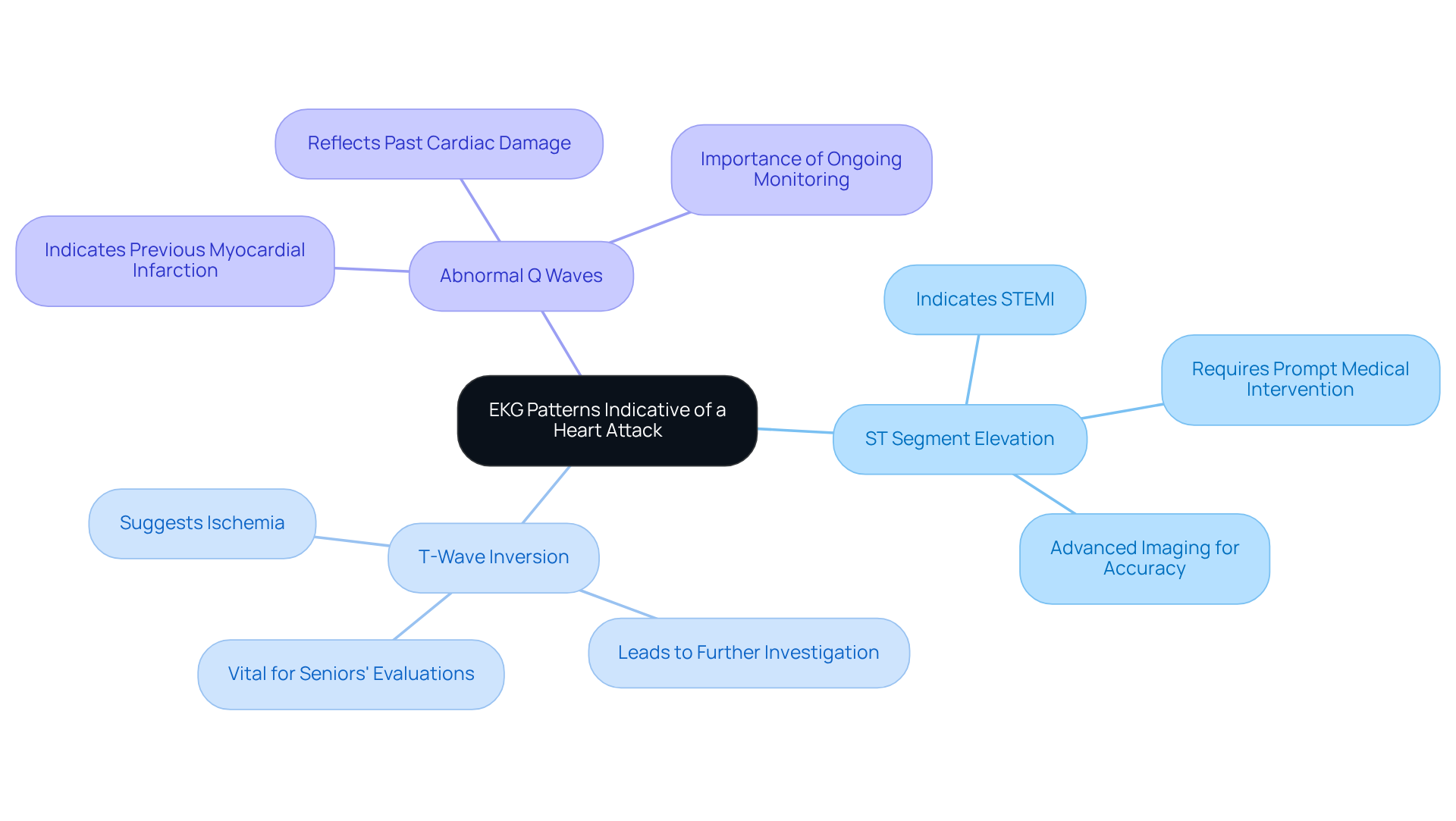
Electrocardiograms are vital in recognizing past myocardial infarctions, as the EKG of a heart attack reveals specific irregularities in the heart's electrical activity. Changes such as alterations in the QRS complex and abnormal Q waves are important indicators found in the EKG of a heart attack. Recent studies show that the EKG of a heart attack can effectively identify previous cardiac events with a success rate of about 48.4%. This information is particularly significant for seniors, as understanding these indicators can help healthcare providers tailor treatment plans and preventive strategies to enhance cardiovascular health.
At Amavita Heart and Vascular Health®, we offer thorough cardiac assessments through our CardioElite™ program, which includes advanced diagnostic tools. These tools, such as AI-driven danger evaluation systems and personalized interventions, are designed to significantly reduce the likelihood of a cardiac event. Our cardiologists emphasize that while electrocardiograms, such as the EKG of a heart attack, are not definitive on their own, they play an essential role in a comprehensive cardiac evaluation, especially when used alongside other diagnostic instruments.
Through our proactive, data-driven care, we strive to transform cardiac services and outcomes for our patients. We understand that navigating heart health can be daunting, but we are here to support you every step of the way. If you have concerns about your cardiovascular health, we encourage you to reach out and discuss your options with us. Your heart deserves the .
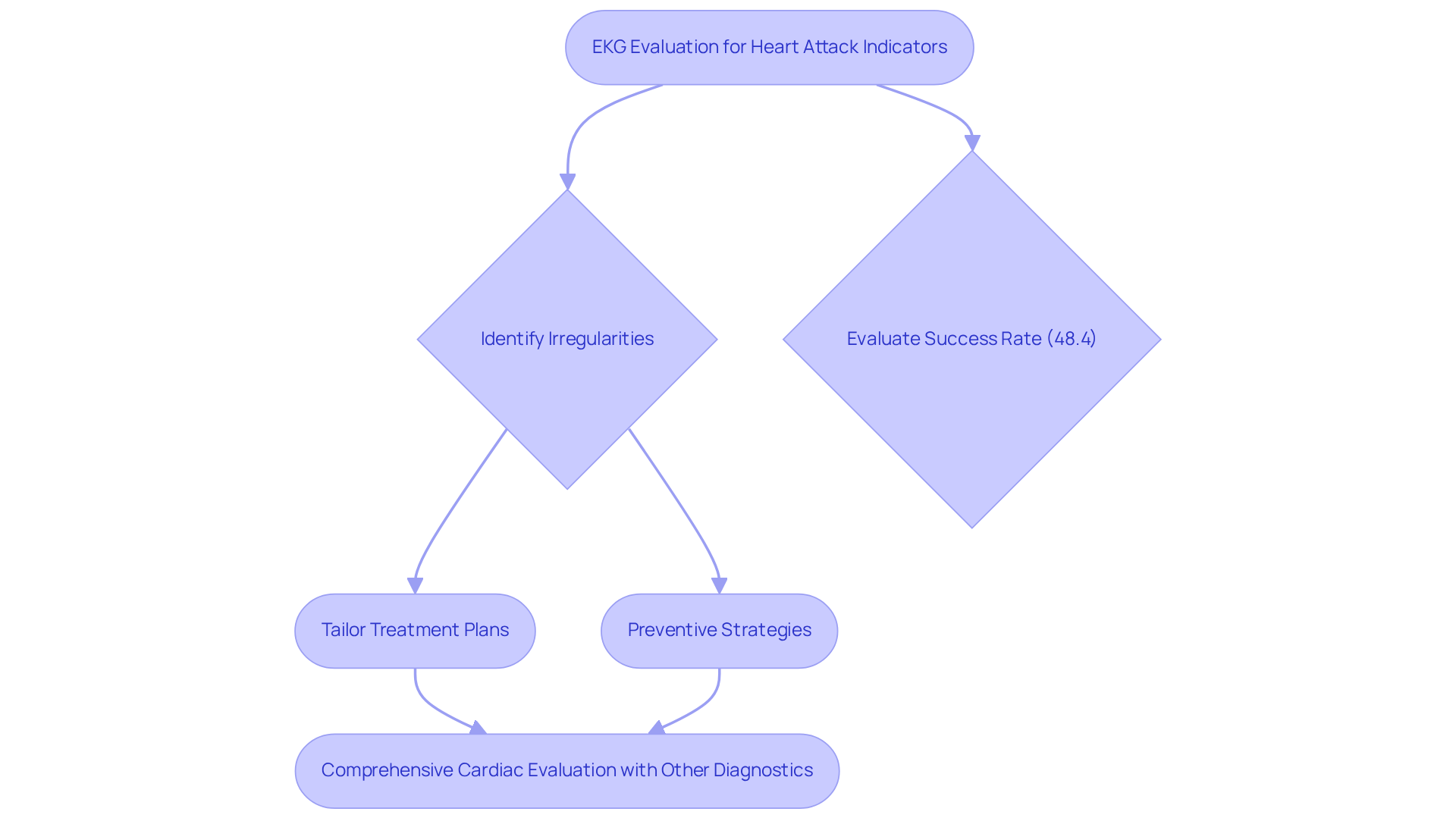
Recent studies highlight the crucial role of the EKG of a heart attack in predicting future cardiac events by identifying irregularities that might not yet present symptoms. Have you ever wondered how irregularities in cardiac rhythm or signs of past ischemia could indicate a higher risk for future cardiovascular incidents? It's important to know that nearly 50% of heart attacks occur silently, often without prior warning signs. This makes not just useful, but essential for early detection, particularly in cases involving an EKG of a heart attack.
For seniors, discussing EKG findings with healthcare professionals can be a vital step toward understanding individual health factors. This conversation can pave the way for personalized prevention strategies, which may include:
In addition to this, advancements in artificial intelligence are enhancing the predictive capabilities of EKGs, allowing for earlier identification of hidden risks associated with coronary artery disease.
By grasping these connections, seniors can take proactive steps towards protecting their heart health. Remember, you are not alone in this journey; seeking support and guidance can make a significant difference in your well-being.
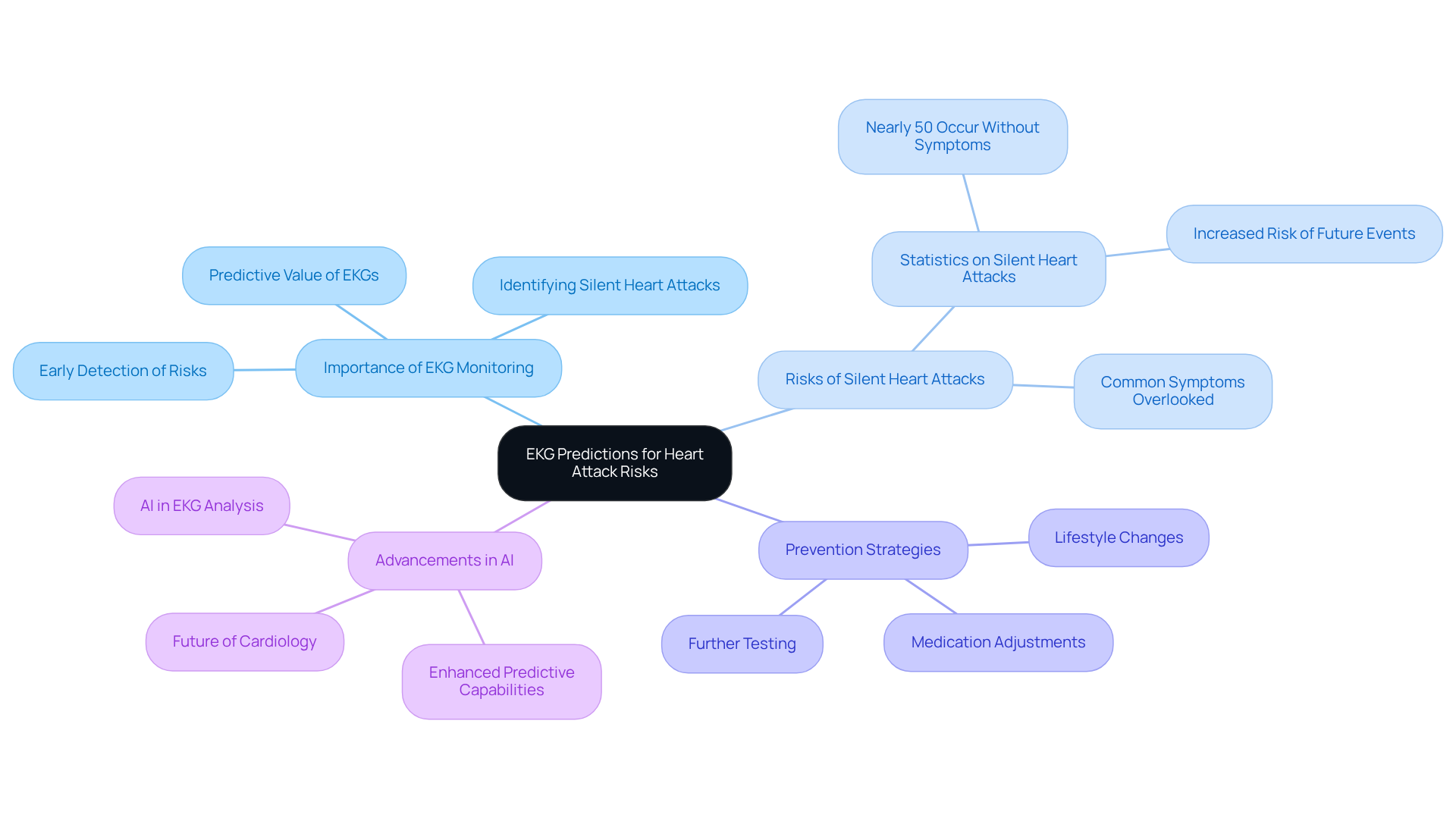
Understanding the EKG of a heart attack is essential for seniors, as it acts as a vital tool in monitoring cardiovascular health and identifying potential risks. The insights provided by electrocardiograms can greatly enhance the detection of heart-related issues, enabling timely medical intervention and improving overall outcomes for elderly individuals.
Throughout this article, we have highlighted key points, including the importance of EKGs in recognizing:
Specific EKG patterns indicative of heart attacks, such as ST segment elevation and T-wave inversion, have been discussed, demonstrating how these readings can guide healthcare providers in making informed decisions. Furthermore, the predictive capabilities of EKGs reveal hidden risks for future cardiac events, underscoring the necessity of regular monitoring and proactive health measures.
In conclusion, the significance of EKGs in cardiac health is profound. For seniors, understanding and utilizing these tests can lead to better health management and prevention of serious heart conditions. Engaging with healthcare professionals about EKG findings and potential lifestyle adjustments can empower individuals to take charge of their heart health. Remember, the journey toward cardiovascular wellness is a shared responsibility, and the resources available can provide the support needed for a healthier future.
What is an EKG and what does it measure?
An electrocardiogram (EKG or ECG) is a non-invasive test that captures the electrical activity of the heart over time, providing insights into its rhythm, size, and position.
Why are EKGs particularly important for seniors?
EKGs are crucial for seniors as they help identify conditions such as arrhythmias, coronary artery disease, and previous cardiac events, which are more prevalent in older adults.
What is the relationship between EKG abnormalities and heart disease risk?
Studies show that abnormalities in EKG readings are significantly linked to an increased risk of coronary artery disease (CHD) and cardiovascular-related fatalities, even when considering factors like smoking and high cholesterol.
Can you provide an example of how EKGs have been studied in seniors?
A study involving over 2,192 healthy adults aged 70 and older found that those with minor EKG changes had a 35% higher likelihood of experiencing heart events during an eight-year follow-up.
How can regular EKG assessments benefit healthcare providers and patients?
Regular EKG assessments can help healthcare providers make informed decisions about treatment and preventive strategies, ultimately improving patient outcomes.
What is the current understanding of EKGs in routine screenings for asymptomatic seniors?
While EKGs are often performed in emergencies, their predictive value in routine screenings for asymptomatic seniors is still being explored.
How can integrating EKG results into health records improve patient care?
Integrating EKG results into electronic health records, along with comprehensive cardiovascular wellness programs, can enhance the assessment and management of older patients, ensuring they receive thorough care.